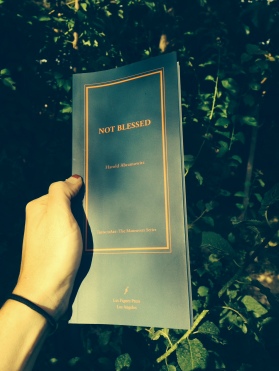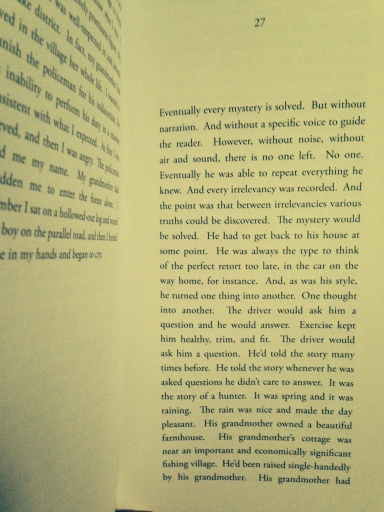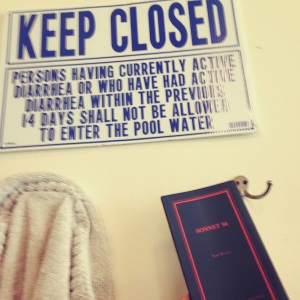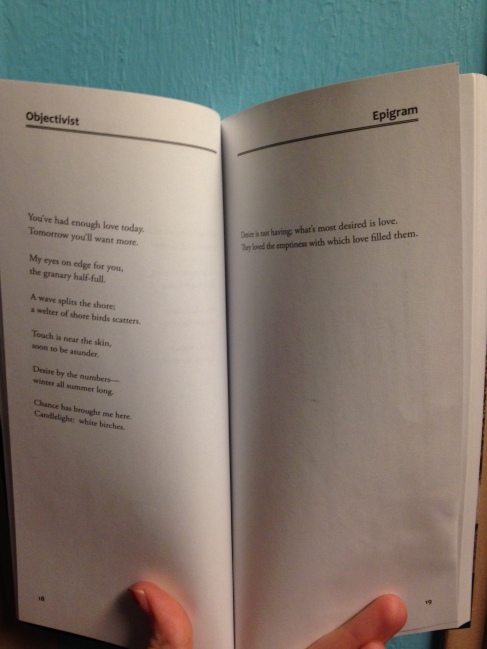Hello Friends,
Les Figues is an important press; their books are innovative and edgy.
I am hopeful that you will help me support this press during their summer Read-a-thon.
This summer I plan on reading 20 Les Figues titles and writing brief response to each, in hopes of sparking a conversation about these works while raising money towards future Les Figues titles. I’m asking for sponsorship in this Read-a-thon; please consider donating $5 dollars toward each book read.
Book love to you,
Nicelle Davis
Day 2 of 30 for The Les Figues Press Read-a-thon
NOT BLESSED by Harold Abramowitz
Do you have a story? You know, The Story—that story that is dusted off for every grant application, personal statement, awkward dinner, cocktail party, newly developing friendship—that story. You’ve told The Story so many times you can feel it shifting on you. Eventually it isn’t even your story anymore, even though it has been drafted and redrafted to define who you are; it’s just a story. You can change it to be funny, tragic, flippant, didactic, meaningful, meaningless. You can feel when your heart is not in it and it flops. You can feel when the story is swelling and growing to be larger than the actual event.
This is the problem with storytelling. The more telling, the more difficult it is to know if the story is true.
NOT BLESSED, by Harold Abramowitz, is a novella in which there is a boy, a grandmother, a hunter, a war, a police officer, a mystery. There might be rain. There might be a radio speaker. There might be a car. There might be a ghost. There might be a doppelganger, or a missed friendship. I say might because these facts change as this same story is told 28 times.
It works! This is really all I can say about this book. It works and works well. I was on edge, turning pages as fast as I could, counting the repetitions, marking the slight changes, and delighting at what felt like small reveals to a larger story. This book works the way intimacy works, that is how intimacy fails; I thought I could figure this character out—thought I could know another person—not by what the character was saying, but by filling in what they weren’t saying.
This is the problem with listening. The more listening, the more difficult it is to know if the story has been heard as it was intended.
This novella is a problem, and like any delightful problem, it isn’t designed to be solved. This work is uniquely human—it feels alive. It morphs a single page story into 81 pages that seem to expand and contract the way most human interactions do.
Day 1 of 30 for The Les Figues Press Read-a-thon
SONNET 56 by Paul Hoover
Today I had 30 minutes because my son had swimming lessons. “Had” is an interesting word—it seems having time these days is about the same as stealing it from the day-to-day. Stealing is what I love most about poetry. Poetry gives us space to think, to be, to choose—poetry allows us to steal our lives back from the daily grind. One poem, one good poem, has infinite possibilities; in this way, poetry is the closest thing I know to freewill. While I may not like the state of the world, there are always other worlds ready to manifest. Poetry is proof of this.
Paul Hoover’s SONNET 56 spins one poem, Shakespeare’s Sonnet 56 into a Haiku, Jingle, Villanelle, Epic (really liked the Epic), Erasure, Ballad, even an Answering Machine fight and a Chat Group discussion. And there are more variations; Hoover has Sonnet 56 bend and shift to 56 incarnations. It’s lovely—it is hopeful and liberating the ways great Jazz or dance can be. Sure, it’s the same idea again and again; however, Hoover is able to deliver somethings entirely original again and again; Hoover proves one idea has endless perspectives—love has endless possibilities. Anything can, could, and will happen.
The variations in this collection range so vastly in tone and form that my stolen 30 minutes felt like a secret lifetime. In this lifetime I was able to question love: how to love, how to be loved, and the relationship between time and love. These poems go from comical to tragic; they skip with satirical-zeal across the shallows of love and submerge its depths even at the risk of drowning. It’s an amazing book.
It was 105 degrees today, so the YMCA pool had more people than water in it. The indoor pool-house was an echo chamber of laughter and splashing, oddly a perfect location for the reoccurrence of the lines, “Return of love, more blest may be the view; / Else call it winter, which being full of care / Makes summer’s welcome thrice more wish’d, more rare.” Between pages, I glimpsed my son’s bright smile bobbing across the waterline. His swim instructor, a kind and beautiful person, would obviously be his first summertime crush. I owe Les Figues Press a great debt; they gave me this moment—this summer—which due to poetry, seems endless.
SONNET 56 (by Shakespeare)
Sweet love, renew thy force; be it not said
Thy edge should blunter be than appetite,
Which but to-day by feeding is allay’d,
To-morrow sharpen’d in his former might:
So, love, be thou; although to-day thou fill
Thy hungry eyes even till they wink with fullness,
To-morrow see again, and do not kill
The spirit of love with a perpetual dullness.
Let this sad interim like the ocean be
Which parts the shore, where two contracted new
Come daily to the banks, that, when they see
Return of love, more blest may be the view;
Else call it winter, which being full of care
Makes summer’s welcome thrice more wish’d, more rare.





